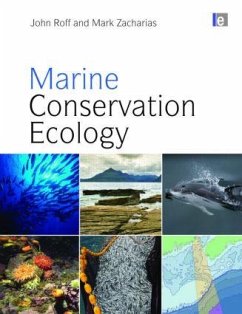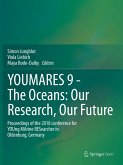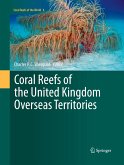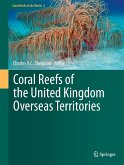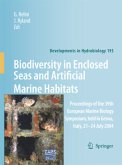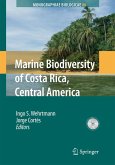- Gebundenes Buch
- Merkliste
- Auf die Merkliste
- Bewerten Bewerten
- Teilen
- Produkt teilen
- Produkterinnerung
- Produkterinnerung
This major textbook provides a broad coverage of the ecological foundations of marine conservation, including the rationale, importance and practicalities of various approaches to marine conservation and management. The scope of the book encompasses an understanding of the elements of and threats to marine biodiversity - from global to local levels - and the structure and function of marine environments as related to conservation issues.
Andere Kunden interessierten sich auch für
![Ocean - The Secret of Planet Earth Ocean - The Secret of Planet Earth]() Carlos M. DuarteOcean - The Secret of Planet Earth27,99 €
Carlos M. DuarteOcean - The Secret of Planet Earth27,99 €![YOUMARES 9 - The Oceans: Our Research, Our Future YOUMARES 9 - The Oceans: Our Research, Our Future]() YOUMARES 9 - The Oceans: Our Research, Our Future38,99 €
YOUMARES 9 - The Oceans: Our Research, Our Future38,99 €![YOUMARES 9 - The Oceans: Our Research, Our Future YOUMARES 9 - The Oceans: Our Research, Our Future]() YOUMARES 9 - The Oceans: Our Research, Our Future39,99 €
YOUMARES 9 - The Oceans: Our Research, Our Future39,99 €![Coral Reefs of the United Kingdom Overseas Territories Coral Reefs of the United Kingdom Overseas Territories]() Coral Reefs of the United Kingdom Overseas Territories75,99 €
Coral Reefs of the United Kingdom Overseas Territories75,99 €![Coral Reefs of the United Kingdom Overseas Territories Coral Reefs of the United Kingdom Overseas Territories]() Coral Reefs of the United Kingdom Overseas Territories77,99 €
Coral Reefs of the United Kingdom Overseas Territories77,99 €![Biodiversity in Enclosed Seas and Artificial Marine Habitats Biodiversity in Enclosed Seas and Artificial Marine Habitats]() Biodiversity in Enclosed Seas and Artificial Marine Habitats149,99 €
Biodiversity in Enclosed Seas and Artificial Marine Habitats149,99 €![Marine Biodiversity of Costa Rica, Central America Marine Biodiversity of Costa Rica, Central America]() Marine Biodiversity of Costa Rica, Central America164,99 €
Marine Biodiversity of Costa Rica, Central America164,99 €-
-
-
This major textbook provides a broad coverage of the ecological foundations of marine conservation, including the rationale, importance and practicalities of various approaches to marine conservation and management. The scope of the book encompasses an understanding of the elements of and threats to marine biodiversity - from global to local levels - and the structure and function of marine environments as related to conservation issues.
Hinweis: Dieser Artikel kann nur an eine deutsche Lieferadresse ausgeliefert werden.
Hinweis: Dieser Artikel kann nur an eine deutsche Lieferadresse ausgeliefert werden.
Produktdetails
- Produktdetails
- Verlag: Taylor & Francis
- Seitenzahl: 476
- Erscheinungstermin: 1. Juni 2011
- Englisch
- Abmessung: 254mm x 189mm x 32mm
- Gewicht: 1212g
- ISBN-13: 9781844078837
- ISBN-10: 1844078833
- Artikelnr.: 32904249
- Herstellerkennzeichnung
- Libri GmbH
- Europaallee 1
- 36244 Bad Hersfeld
- gpsr@libri.de
- Verlag: Taylor & Francis
- Seitenzahl: 476
- Erscheinungstermin: 1. Juni 2011
- Englisch
- Abmessung: 254mm x 189mm x 32mm
- Gewicht: 1212g
- ISBN-13: 9781844078837
- ISBN-10: 1844078833
- Artikelnr.: 32904249
- Herstellerkennzeichnung
- Libri GmbH
- Europaallee 1
- 36244 Bad Hersfeld
- gpsr@libri.de
John Roff was Professor and Canada Research Chair in Environmental Science and Conservation at Acadia University, Canada, and is now European Scholar in the EU Erasmus Mundus Programme. Mark Zacharias is Adjunct Associate Professor of Geography at the University of Victoria, Canada, and Assistant Deputy Minister with the Province of British Columbia, Canada. The book also includes earlier contributions by Jon Day, who is currently Director, Ecosystem Conservation and Sustainable Use, with the Great Barrier Reef Marine Park Authority in Australia. Jon's contributions primarily occurred during the late 1990s when he was working in North America, but today Jon's expertise is widely recognized in marine spatial planning and marine management matters.
Preface. Marine Conservation Ecology: Concepts and Frameworks 1.
Introduction: Why Marine Conservation is Necessary - Significance,
Threats, and Management of the Oceans and Biodiversity 2. The Marine
Environment: Physico-chemical Characteristics - Structures and
Processes, Enduring and Recurrent factors 3. The Marine Environment:
Ecology and Biology Pelagic and Benthic Realms and Coastal Fringing
Communities 4. Approaches to Marine Conservation Traditional Strategies
and Ecological Frameworks 5. Representative Areas: Global to Ecoregional -
Marine Conservation at the Ecosystem / Habitat Level 6. Habitats and
Communities: Ecoregional to Local - Reality, Variability and Scales of
Relationships 7. Distinctive Areas: Species and Ecosystem Processes
Ecosystem Processes - Ergoclines and Hotspots 8. Patterns of Biodiversity:
Species Diversity - Theories and Relationships: Global, Regional, Local 9.
Species and Focal Species - Keystones, Umbrellas, Flagships, Indicators and
Others 10. Genetic Diversity Significance of Genetics: From Genes to
Ecosystems 11. Coastal zones Components, Complexities and Classifications
12. High Seas and Deep Seas Pelagic and Benthic, Hydrography and
Biogeography 13. Linking Fisheries Management with Marine Conservation
Objectives through Ecosystem Approaches - Compatibility of Exploitation and
Preservation 14. Size and Boundaries of Protected Areas - Rationale for
Function, Location, Dimensions 15. Evaluation of Protected Areas - The
Concept of 'Value' as Applied to Marine Biodiversity 16. Sets of Protected
Areas - Integrating Distinctive and Representative Protected Areas 17.
Networks of Protected Areas - Patterns of Connectivity in the Oceans 18.
Approaches to the Establishment of Marine Monitoring Programs - Stabilizing
the Baselines 19. Remaining Problems in Marine Conservation - Present
Problems, Future Solutions. Index
Introduction: Why Marine Conservation is Necessary - Significance,
Threats, and Management of the Oceans and Biodiversity 2. The Marine
Environment: Physico-chemical Characteristics - Structures and
Processes, Enduring and Recurrent factors 3. The Marine Environment:
Ecology and Biology Pelagic and Benthic Realms and Coastal Fringing
Communities 4. Approaches to Marine Conservation Traditional Strategies
and Ecological Frameworks 5. Representative Areas: Global to Ecoregional -
Marine Conservation at the Ecosystem / Habitat Level 6. Habitats and
Communities: Ecoregional to Local - Reality, Variability and Scales of
Relationships 7. Distinctive Areas: Species and Ecosystem Processes
Ecosystem Processes - Ergoclines and Hotspots 8. Patterns of Biodiversity:
Species Diversity - Theories and Relationships: Global, Regional, Local 9.
Species and Focal Species - Keystones, Umbrellas, Flagships, Indicators and
Others 10. Genetic Diversity Significance of Genetics: From Genes to
Ecosystems 11. Coastal zones Components, Complexities and Classifications
12. High Seas and Deep Seas Pelagic and Benthic, Hydrography and
Biogeography 13. Linking Fisheries Management with Marine Conservation
Objectives through Ecosystem Approaches - Compatibility of Exploitation and
Preservation 14. Size and Boundaries of Protected Areas - Rationale for
Function, Location, Dimensions 15. Evaluation of Protected Areas - The
Concept of 'Value' as Applied to Marine Biodiversity 16. Sets of Protected
Areas - Integrating Distinctive and Representative Protected Areas 17.
Networks of Protected Areas - Patterns of Connectivity in the Oceans 18.
Approaches to the Establishment of Marine Monitoring Programs - Stabilizing
the Baselines 19. Remaining Problems in Marine Conservation - Present
Problems, Future Solutions. Index
Preface. Marine Conservation Ecology: Concepts and Frameworks 1. Introduction: Why Marine Conservation is Necessary - Significance, Threats, and Management of the Oceans and Biodiversity 2. The Marine Environment: Physico-chemical Characteristics - Structures and Processes, Enduring and Recurrent factors 3. The Marine Environment: Ecology and Biology Pelagic and Benthic Realms and Coastal Fringing Communities 4. Approaches to Marine Conservation Traditional Strategies and Ecological Frameworks 5. Representative Areas: Global to Ecoregional - Marine Conservation at the Ecosystem / Habitat Level 6. Habitats and Communities: Ecoregional to Local - Reality, Variability and Scales of Relationships 7. Distinctive Areas: Species and Ecosystem Processes Ecosystem Processes - Ergoclines and Hotspots 8. Patterns of Biodiversity: Species Diversity - Theories and Relationships: Global, Regional, Local 9. Species and Focal Species - Keystones, Umbrellas, Flagships, Indicators and Others 10. Genetic Diversity Significance of Genetics: From Genes to Ecosystems 11. Coastal zones Components, Complexities and Classifications 12. High Seas and Deep Seas Pelagic and Benthic, Hydrography and Biogeography 13. Linking Fisheries Management with Marine Conservation Objectives through Ecosystem Approaches - Compatibility of Exploitation and Preservation 14. Size and Boundaries of Protected Areas - Rationale for Function, Location, Dimensions 15. Evaluation of Protected Areas - The Concept of 'Value' as Applied to Marine Biodiversity 16. Sets of Protected Areas - Integrating Distinctive and Representative Protected Areas 17. Networks of Protected Areas - Patterns of Connectivity in the Oceans 18. Approaches to the Establishment of Marine Monitoring Programs - Stabilizing the Baselines 19. Remaining Problems in Marine Conservation - Present Problems, Future Solutions. Index
Preface. Marine Conservation Ecology: Concepts and Frameworks 1.
Introduction: Why Marine Conservation is Necessary - Significance,
Threats, and Management of the Oceans and Biodiversity 2. The Marine
Environment: Physico-chemical Characteristics - Structures and
Processes, Enduring and Recurrent factors 3. The Marine Environment:
Ecology and Biology Pelagic and Benthic Realms and Coastal Fringing
Communities 4. Approaches to Marine Conservation Traditional Strategies
and Ecological Frameworks 5. Representative Areas: Global to Ecoregional -
Marine Conservation at the Ecosystem / Habitat Level 6. Habitats and
Communities: Ecoregional to Local - Reality, Variability and Scales of
Relationships 7. Distinctive Areas: Species and Ecosystem Processes
Ecosystem Processes - Ergoclines and Hotspots 8. Patterns of Biodiversity:
Species Diversity - Theories and Relationships: Global, Regional, Local 9.
Species and Focal Species - Keystones, Umbrellas, Flagships, Indicators and
Others 10. Genetic Diversity Significance of Genetics: From Genes to
Ecosystems 11. Coastal zones Components, Complexities and Classifications
12. High Seas and Deep Seas Pelagic and Benthic, Hydrography and
Biogeography 13. Linking Fisheries Management with Marine Conservation
Objectives through Ecosystem Approaches - Compatibility of Exploitation and
Preservation 14. Size and Boundaries of Protected Areas - Rationale for
Function, Location, Dimensions 15. Evaluation of Protected Areas - The
Concept of 'Value' as Applied to Marine Biodiversity 16. Sets of Protected
Areas - Integrating Distinctive and Representative Protected Areas 17.
Networks of Protected Areas - Patterns of Connectivity in the Oceans 18.
Approaches to the Establishment of Marine Monitoring Programs - Stabilizing
the Baselines 19. Remaining Problems in Marine Conservation - Present
Problems, Future Solutions. Index
Introduction: Why Marine Conservation is Necessary - Significance,
Threats, and Management of the Oceans and Biodiversity 2. The Marine
Environment: Physico-chemical Characteristics - Structures and
Processes, Enduring and Recurrent factors 3. The Marine Environment:
Ecology and Biology Pelagic and Benthic Realms and Coastal Fringing
Communities 4. Approaches to Marine Conservation Traditional Strategies
and Ecological Frameworks 5. Representative Areas: Global to Ecoregional -
Marine Conservation at the Ecosystem / Habitat Level 6. Habitats and
Communities: Ecoregional to Local - Reality, Variability and Scales of
Relationships 7. Distinctive Areas: Species and Ecosystem Processes
Ecosystem Processes - Ergoclines and Hotspots 8. Patterns of Biodiversity:
Species Diversity - Theories and Relationships: Global, Regional, Local 9.
Species and Focal Species - Keystones, Umbrellas, Flagships, Indicators and
Others 10. Genetic Diversity Significance of Genetics: From Genes to
Ecosystems 11. Coastal zones Components, Complexities and Classifications
12. High Seas and Deep Seas Pelagic and Benthic, Hydrography and
Biogeography 13. Linking Fisheries Management with Marine Conservation
Objectives through Ecosystem Approaches - Compatibility of Exploitation and
Preservation 14. Size and Boundaries of Protected Areas - Rationale for
Function, Location, Dimensions 15. Evaluation of Protected Areas - The
Concept of 'Value' as Applied to Marine Biodiversity 16. Sets of Protected
Areas - Integrating Distinctive and Representative Protected Areas 17.
Networks of Protected Areas - Patterns of Connectivity in the Oceans 18.
Approaches to the Establishment of Marine Monitoring Programs - Stabilizing
the Baselines 19. Remaining Problems in Marine Conservation - Present
Problems, Future Solutions. Index
Preface. Marine Conservation Ecology: Concepts and Frameworks 1. Introduction: Why Marine Conservation is Necessary - Significance, Threats, and Management of the Oceans and Biodiversity 2. The Marine Environment: Physico-chemical Characteristics - Structures and Processes, Enduring and Recurrent factors 3. The Marine Environment: Ecology and Biology Pelagic and Benthic Realms and Coastal Fringing Communities 4. Approaches to Marine Conservation Traditional Strategies and Ecological Frameworks 5. Representative Areas: Global to Ecoregional - Marine Conservation at the Ecosystem / Habitat Level 6. Habitats and Communities: Ecoregional to Local - Reality, Variability and Scales of Relationships 7. Distinctive Areas: Species and Ecosystem Processes Ecosystem Processes - Ergoclines and Hotspots 8. Patterns of Biodiversity: Species Diversity - Theories and Relationships: Global, Regional, Local 9. Species and Focal Species - Keystones, Umbrellas, Flagships, Indicators and Others 10. Genetic Diversity Significance of Genetics: From Genes to Ecosystems 11. Coastal zones Components, Complexities and Classifications 12. High Seas and Deep Seas Pelagic and Benthic, Hydrography and Biogeography 13. Linking Fisheries Management with Marine Conservation Objectives through Ecosystem Approaches - Compatibility of Exploitation and Preservation 14. Size and Boundaries of Protected Areas - Rationale for Function, Location, Dimensions 15. Evaluation of Protected Areas - The Concept of 'Value' as Applied to Marine Biodiversity 16. Sets of Protected Areas - Integrating Distinctive and Representative Protected Areas 17. Networks of Protected Areas - Patterns of Connectivity in the Oceans 18. Approaches to the Establishment of Marine Monitoring Programs - Stabilizing the Baselines 19. Remaining Problems in Marine Conservation - Present Problems, Future Solutions. Index

